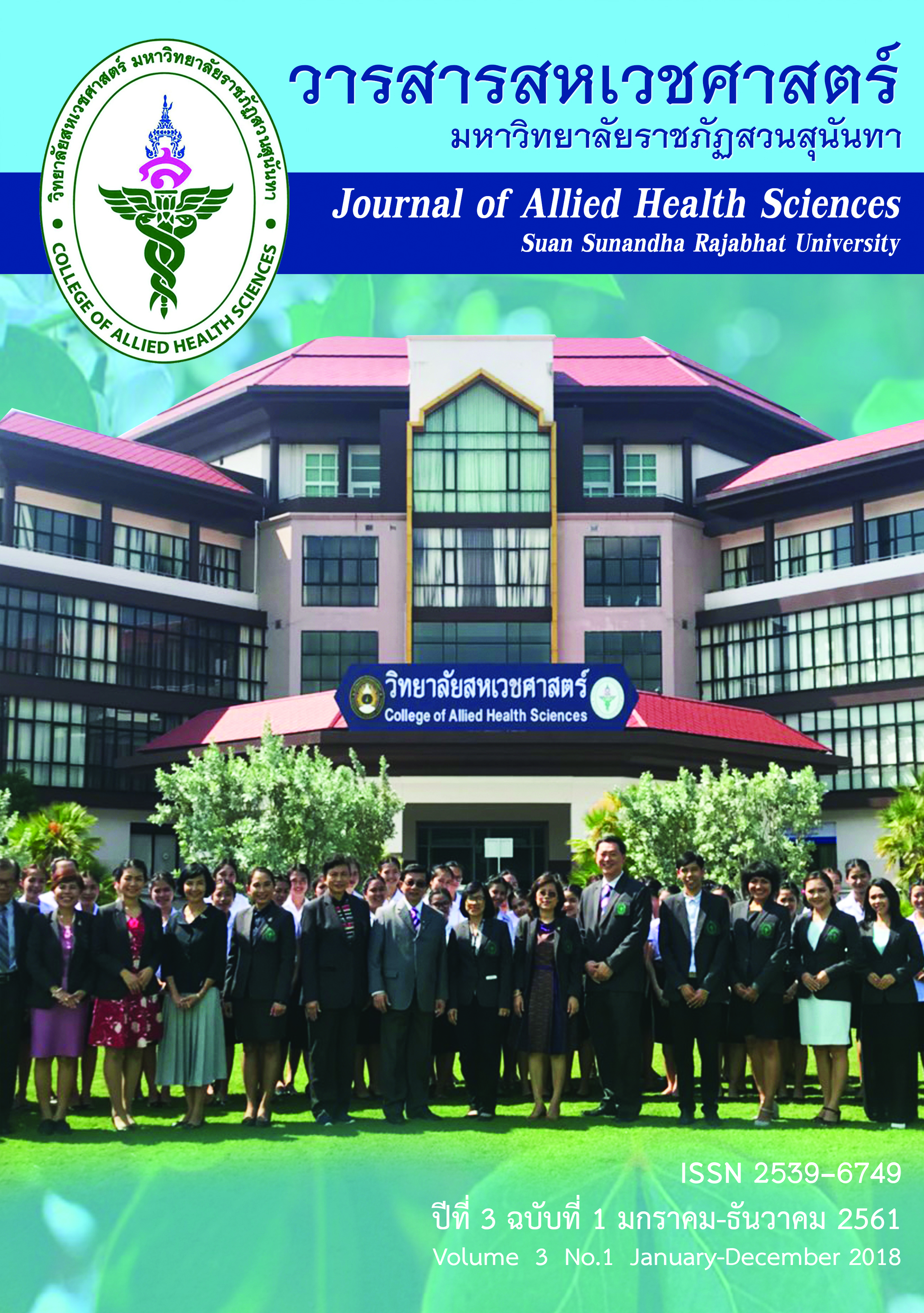ความไวในการกำจัดลูกน้ำยุงลายบ้าน (Aedes aegypti L .) พาหะนำโรคไข้เลือดออก ของแบคทีเรีย Bacillus thuringiensis israelensis ในอำเภอเมือง จังหวัดสมุทรสงคราม Insecticide susceptibility of Aedes aegypti (L .) larvae to Bacillus thuringiensis israelensis in Muang Samut Songkhram District of Samut Songkhram Province, Thailand
Main Article Content
บทคัดย่อ
โรคไข้เลือดออกเป็นปัญหาสาธารณสุขที่สำคัญในพื้นที่เขตร้อนและเขตอบอุ่น รวมทั้งประเทศไทย จังหวัดสมุทรสงครามเป็นพื้นที่หนึ่งที่มีการระบาดของโรคไข้เลือดออกที่ค่อนข้างสูง สำหรับการควบคุมโรคเหล่านี้จะมุ่งเน้นการควบคุมลูกน้ำยุงลายบ้าน (Aedes aegypti L.) เนื่องจากเป็นพาหะนำโรคหลัก ซึ่งต้องหาวิธีทางเลือกต่างๆ เพื่อควบคุมให้มีประสิทธิภาพมากยิ่งขึ้นนอกเหนือจากสารเคมีเทมีฟอสที่เริ่มมีรายงานการความต้านทานของยุงลาย การวิจัยครั้งนี้มีวัตถุประสงค์เพื่อศึกษาความไวในการกำจัดลูกน้ำยุงลายบ้าน พาหะนำโรคไข้เลือดออกของแบคทีเรีย Bacillus thuringiensis israelensis ในอำเภอเมือง จังหวัดสมุทรสงคราม ซึ่งเป็นพื้นที่ของการระบาดของโรคไข้เลือดออก โดยรวบรวมตัวอย่างลูกน้ำในช่วงเดือนสิงหาคม ถึง กันยายน
พ.ศ. 2559 แล้วนำมาทดสอบตามขั้นตอนขององค์การอนามัยโลกในห้องปฏิบัติการ วิทยาลัยสหเวชศาสตร์ มหาวิทยาลัยราชภัฏสวนสุนันทา ศูนย์การศึกษาจังหวัดสมุทรสงคราม จากผลการศึกษาความไวในการกำจัดลูกน้ำยุงลายบ้านของ Bti พบว่าลูกน้ำมีความไวต่อการกำจัดอยู่ในระดับที่สูง โดยมีอัตราตายภายใน 24 ช.ม.เท่ากับร้อยละ 100 ซึ่งแสดงให้เห็นว่า Bti มีประสิทธิภาพในการกำจัดลูกน้ำได้สูงและสามารถเป็นทางเลือกหนึ่งในการควบคุมยุงลายบ้านในจังหวัดสมุทรสงครามและพื้นที่อื่นๆ นำไปสู่การลดจำนวนผู้ป่วยโรคไข้เลือดออกต่อไป
Dengue hemorrhagic fever (DHF) is a public health problem in the world, especially tropical and sub-tropical countries including Thailand. Samut Songkhram province is one
of the areas undergoing an high epidemic of this disease. To control the spread, we focus on decreasing population of Aedes aegypti (L .) larvae in the area. The aims of this research were
to study insecticide susceptibility of Ae. aegypti larvae to Bacillus thuringiensis israelensis
in Muang Samut Songkhram District of Samut Songkhram Province, Thailand. We collected mosquito larvae specimen by ovitraps between August and September 2016. The results revealed that Ae. aegypti is susceptible to Bti in study site, with a 100% death rate. Exposure to Bti eradicated the larvae in a very short time of less than 18 hours. Then, results demonstrate insecticidal bacterium may be an option to reduce the number of DHF patients in Samutsongkhram, Thailand.

